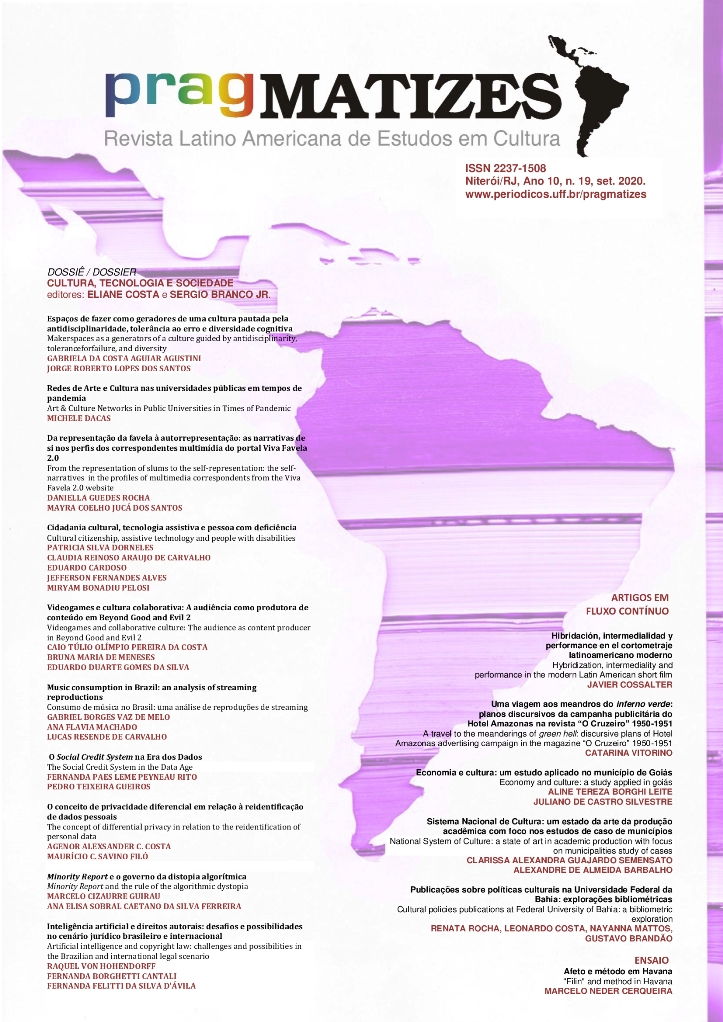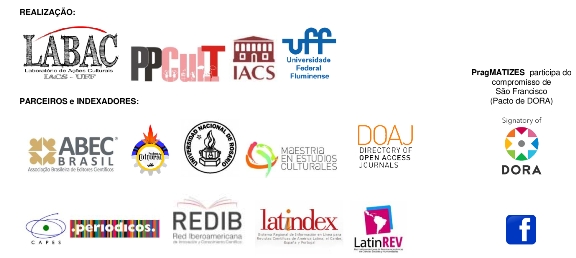Espacios de hacer como generadores de una cultura guiada por la antidisciplinariedad, la tolerancia al error y la diversidad cognitiva
DOI:
https://doi.org/10.22409/pragmatizes.v10i19.42522Palabras clave:
experimental, design, creatividad, cultura digital, espacios de hacerResumen
Este artículo propone que tres valores tienen un papel importante en estimular la generación de nuevas ideas y expandir el acceso al conocimiento, cuando se incorporan a las prácticas de los espacios de aprendizaje tecnológico (los espacios para hacer, aquí llamados laboratorios). Ellos son: antidisciplinariedad, tolerancia al error y diversidad cognitiva. El trabajo se inserta en el contexto marcado por la democratización de las tecnologías que permiten a los ciudadanos fuera de los principales centros de investigación y la industria materializar sus ideas, expresar su visión del mundo, su creatividad y generar conocimiento a partir de la interacción con los artefactos. Y busca contribuir a reflexiones sobre la sociedad digital y la necesidad de comprender las prácticas tecnológicas basadas en sus aspectos culturales.Descargas
Citas
ACKERMANN, E. K. Give me a place to stand and I will move the world! Life-long learning in the digital age. Journal for the Study of Education and Development. Volume 38, Issue 4, 2015. Disponível em: <https://www.tandfonline.com/doi/full/10.1080/02103702.2015.1076265>. Acesso em: 10 mar. 2020.
BLIKSTEIN, P. Maker Movement in Education: History and Prospects. In: M.J. de Vries (ed.). Handbook of Technology Education. Springer International, 2018.
BLIKSTEIN, P. O mito do mau aluno e porque o Brasil pode ser o líder mundial de uma revolução educacional. Sem data. Disponível em: <http://blikstein.com/paulo/documents/books/Blikstein-Brasil_pode_ser_lider_mundial_em_educacao.pdf>. Acesso em: 15 mar. 2020.
DAUGHERTY, M. K. The Prospect of an “A” in STEM Education. Journal of STEM Education, Volume 14, Issue 2, abr.-jun. 2013. Disponível em: <https://www.jstem.org/jstem/index.php/JSTEM/article/view/1744/1520>. Acesso em: 5 mar. 2020.
DOUGHERTY, D. “The Maker Movement”. MIT Press Journals, 2012. Disponível em: < https://www.mitpressjournals.org/doi/pdf/10.1162/INOV_a_00135>. Acesso em: 10 mar. 2020.
DOUGHERTY, D. Free to Make: How the Maker Movement Is Changing Our Schools, Our Jobs, and Our Minds. North Atlantic Books, 2016.
DUNNE, A.; RABY, F. Speculative Everything: Design, Fiction, and Social Dreaming. Cambridge, Massachusetts: The MIT Press, 2013.
EDMONDSON, A. Strategies for Learning from Failure. Harvard Business Review. Edição Abril de 2011. Disponível em: < https://hbr.org/2011/04/strategies-for-learning-from-failure>. Acessado em: 10 mar. 2020.
EGBERT, M. Creating Makers: How to Start a Learning Revolution at Your Library. Libraries Unlimited, 2016.
GARBER, E.; HOCHTRITT, L.; SHARMA, M. Introduction. In: Makers, Crafters, Educators: Working for Cultural Change. Oxford: Routledge, 2019.
GOODE, L. Why the ‘Queen of Shitty Robots’ Renounced Her Crown. Wired magazine, 12 out. 2019. Disponível em: <https://www.wired.com/story/simone-giertz-build-what-you-want/>. Acesso em: 10 mar. 2020.
GORE, N. Craft and innovation: Serious play and the direct experience of the real. Journal of Architectural Education, Volume 58, Issue 1, pp. 39-44, 2004.
HALVERSON, E.; SHERIDAN, K. M. 2014. The Maker Movement in Education. Harvard Educational Review, Vol. 84, No. 4, inverno de 2014. Disponível em: <https://www.semanticscholar.org/paper/The-Maker-Movement-in-Education-Halverson-Sheridan/66147755ddbaaa159bd5c59bcfad72f33e5c427b>. Acesso em: 7
INGOLD, T. Making: Anthropology, Archaeology, Art and Architecture. Onxford: Routledge, 2013.
ITO, J. Design and Science: Can design advance science, and can science advance design? Journal Of Desing and Science, 12 jan. 2016. Disponível em: <https://jods.mitpress.mit.edu/pub/designandscience>. Acesso em: 20 mar. 2020.
ITO, J.; HOWE, J. Disrupção e inovação: como sobreviver ao futuro incerto. Rio de Janeiro: Alta Books, 2018.
KELLY, K. What scientific concept would improve everybody’s cognitive toolkit? 2011. Disponível em: <https://www.edge.org/response-detail/10422>. Acesso em: 5 mar. 2020.
LAND, M. H. Full STEAM Ahead: The Benefits of Integrating the Arts Into STEM. Procedia Computer Science, Volume 20, pp. 547-552, 2013.
LEITE, P. P. Sobre a distinção entre história e evolução em Tim Ingold. Social Evolution & History, Vol. 1, No. 1, pp. 5-24, jul. 2002. Disponível em: <https://globalherit.hypotheses.org/6719>. Acesso em: 9 mar. 2020.
MARCHAND, T. H. J. Learning, Education and Apprenticeship. Journal of the Royal Anthropological Institute, 18 (1). pp. 209-210, 2012.
MITCHELL, R.; NICHOLAS, S. Knowledge Creation in Groups: The Value of Cognitive Diversity, Transactive Memory and Open-mindedness Norms. Electronic Journal of Knowledge Management, Volume 4, Issue 1, pp. 67-74, 2006. Disponível em: < https://www.researchgate.net/publication/220826009_Knowledge_Creation_in_Groups_The_Value_of_Cognitive_Diversity_Transactive_Memory_and_Openmindedness_Norms>. Acesso em: 5 mar. 2020.
OXMAN, N. Age of Entanglement. 2016. Disponível em: <https://jods.mitpress.mit.edu/pub/AgeOfEntanglement>. Acesso em: 3 mar. 2020.
SANDERS, M. Becoming a Learner: Realizing the Opportunity of Education. Institute for Communication & Leadership, 2012.
SILVA, R. B.; MERKLE, L. E. Perspectivas educacionais FabLearn: conceitos e práticas maker no Brasil. In: Fablearn Conference, 2016. Disponível em: <https://www.researchgate.net/publication/308098069_Perspectivas_educacionais_FabLearn_conceitos_e_praticas_maker_no_Brasil>. Acesso em: 5 mar. 2020.
SNOWDEN, E. Eterna vigilância: como montei e desvendei o maior sistema de espionagem do mundo. São Paulo: Planeta, 2019.
STAPPERS, P.; GIACCARDI, E. Research through Design. The Encyclopedia of Human-Computer Interaction, 2nd Ed., Sem data. Disponível em: <https://www.interaction-design.org/literature/book/the-encyclopedia-of-human-computer-interaction-2nd-ed/research-through-design>. Acesso em: 7 mar. 2020.
##submission.downloads##
Publicado
Cómo citar
Número
Sección
Licencia
Autores que publican en esta revista están de acuerdo con os siguientes términos:
- Autores mantienen los derechos autorales y conceden a la revista el derecho de propiedad, con el trabajo simultáneamente estando licenciado bajo Licencia Creative Commons Attribution que permite el compartimiento del trabajo con reconocimiento de la autoría y publicación inicial en esta revista.
- La revista se reserva el derecho de efectuar, en los originales, alteraciones de orden normativo, ortográfico y gramatical.
- Las pruebas finales no serán presentadas a los autores.
- Las opiniones emitidas por los autores son de su exclusiva responsabilidad.



